
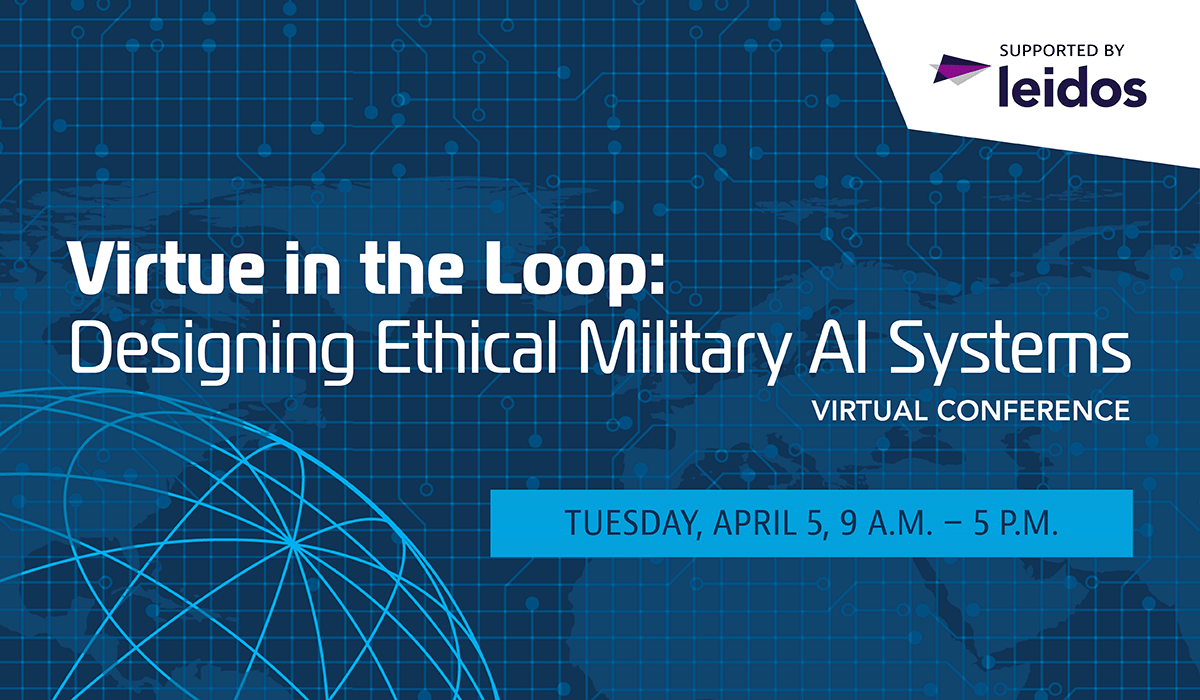
Artificial intelligence (AI) has become an essential component of the military’s toolbox. Virtue in the Loop: Designing Ethical Military AI Systems will explore the ethics of human-machine interactions and how military AI systems can foster virtuous actions.
Creation and governance of AI use spans many fields from scholars to practitioners: philosophers, theologians, military experts, policy-makers, and programmers. The conference brings together an interdisciplinary group to foster discussion that will allow the development of new pathways for guiding the ethical use of these rapidly expanding tools.
Aaron Dominguez, Provost
The Catholic University of America
Ron Keesing, Vice President for Artificial Intelligence
Leidos
Paul Scherz, Associate Professor of Moral Theology/Ethics
The Catholic University of America, School of Theology and Religious Studies
Paul Scharre, Vice President and Director of Studies
Center for a New American Security
Luis Vera, Assistant Professor of Theology
Mount Saint Mary’s University
Colonel James Cook, Permanent Professor and Head of the Department of Philosophy
U.S. Air Force Academy
Jonathan Askonas, Assistant Professor
The Catholic University of America, School of Arts and Sciences
Anna Feuer, Julian Steward Chair of Social Sciences
Deep Springs College
Maaike Verbruggen, Ph.D. Researcher
Institute for European Studies
Nigel Biggar, Regius Professor of Moral and Pastoral Theology
University of Oxford
Anton Barba-Kay, Associate Professor
The Catholic University of America, School of Philosophy
Bruce Jette
President and CEO, Innvistra, LLC
Former Assistant Secretary of the Army for Acquisition, Logistics and Technology
Sarah Kreps, John L. Wetherill Professor
Cornell University, Department of Government
Mary Magee Quinn, PhD, PMP, Human Systems Integration SME
Leidos
Bartlett Russell, Program Manager
DARPA
Joe Chapa, Chief Responsible AI Ethics Officer
United States Air Force

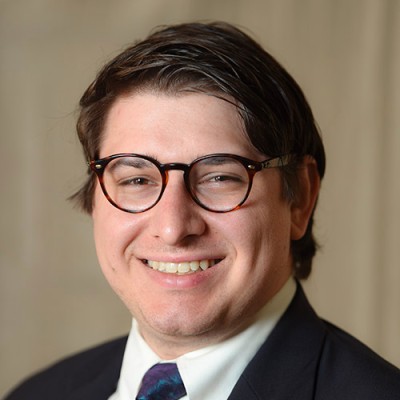 Jonathan Askonas, Assistant Professor and Director of Undergraduate Studies
Jonathan Askonas, Assistant Professor and Director of Undergraduate Studies
The Catholic University of America, School of Arts and Sciences
Jon Askonas works on the connections between the republican tradition, technology, and national security. He has a BS in International Politics (summa cum laude) from Georgetown University and a MPhil and DPhil in International Relations from Oxford. He has worked at the Council on Foreign Relations, US Embassy in Moscow, and the Clements Center for National Security at the University of Texas at Austin, and his work has been supported by the Beinecke Scholarship, the Smith Richardson Foundation, and the Cyril Foster Fund. His writing has appeared in Russian Analytical Digest, Triple Helix, The New Atlantis, Fare Forward, War on the Rocks, and the Texas National Security Review.
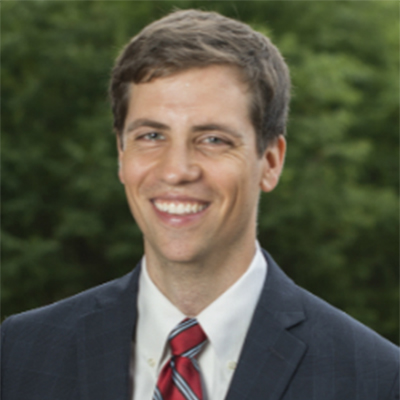 Anton Barba-Kay, Associate Professor
Anton Barba-Kay, Associate Professor
The Catholic University of America, School of Philosophy
Antón Barba-Kay is Associate Professor of Philosophy in the School of Philosophy at the Catholic University of America in Washington, D.C. Antón Barba-Kay earned a B.A. from St. John’s College (Annapolis), a B.A. (in Classics) from the University of Cambridge, and a Ph.D. from the University of Chicago’s Committee on Social Thought. His academic work concerns 19th century continental philosophy, especially Hegel. His articles have appeared in Hegel-Studien, the Review of Metaphysics, and Journal of the History of Philosophy. In 2017-2018 he was a Visiting Fellow in the James Madison Program at Princeton University.
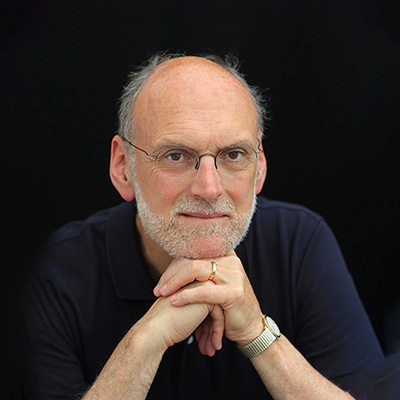 Nigel Biggar, Regius Professor of Moral and Pastoral Theology
Nigel Biggar, Regius Professor of Moral and Pastoral Theology
University of Oxford
Nigel Biggar is the Regius Professor of Moral and Pastoral Theology at the University of Oxford, where he also directs the McDonald Centre for Theology, Ethics, and Public Life. He holds a B.A. in Modern History from Oxford University and a Ph.D. in Christian Theology & Ethics from the University of Chicago. He was appointed C.B.E. in the 2021 Queen’s Birthday Honours list.
Among his recent publications are What’s Wrong with Rights? (2020), In Defence of War (2013), and Between Kin and Cosmopolis: An Ethic of the Nation (2014). His next book, Colonialism: A Moral Reckoning will be published in July 2022.
In the press, he has written on the possibility of a Truth and Reconciliation Commission for Northern Ireland in the Irish Times, on the Iraq war in the Financial Times, and on the UK’s military action against ‘Islamic State’ in Syria in The [London] Times.
He has lectured at the UK Defence Academy, Shrivenham; the Centre for Historical Analysis and Conflict Research, Camberley; the Führungsakademie der Bundeswehr, Hamburg; the US Military Academy, West Point; and the National Defense University, Washington, DC.
His hobbies include visiting battlefields. In 2015 and 2017 he trekked across the mountains of central Crete in the footsteps of Patrick Leigh-Fermor and his comrades, when they abducted General Kreipe in April-May 1944.
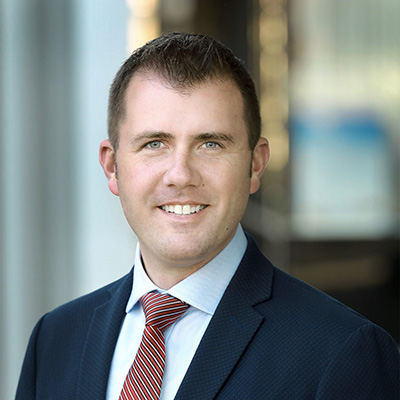 Joe Chapa, Chief Responsible AI Ethics Officer
Joe Chapa, Chief Responsible AI Ethics Officer
United States Air Force
Joseph O. Chapa is an officer in the U.S. Air Force and serves as the Department of the Air Force Chief Responsible AI Officer (CRAEO). He also leads the AI Cross-Functional Team in Air Force Futures. He holds a doctorate in philosophy from the University of Oxford. His areas of expertise include just war theory, military ethics, and especially the ethics of remote and autonomous weapons. He is a senior pilot with more than 1,400 pilot and instructor pilot hours, many of which were flown in support of major U.S. combat and humanitarian operations. His book, Is Remote Warfare Moral? with PublicAffairs Books will be out in July, 2022.
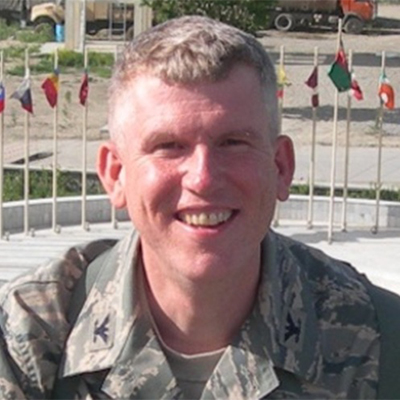 Colonel James Cook, Permanent Professor and Head of the Department of Philosophy
Colonel James Cook, Permanent Professor and Head of the Department of Philosophy
U.S. Air Force Academy
Colonel James L. Cook is Permanent Professor and Head, Department of Philosophy, U.S. Air Force Academy, Colorado Springs, Colorado. A Cyber and Foreign Area Officer, he has served in Europe, Afghanistan, and at the Pentagon. He earned his Ph.D in philosophy from the Universität-Heidelberg, Germany. He is co-editor of the Journal of Military Ethics and publishes on philosophical topics including the ethics of war.
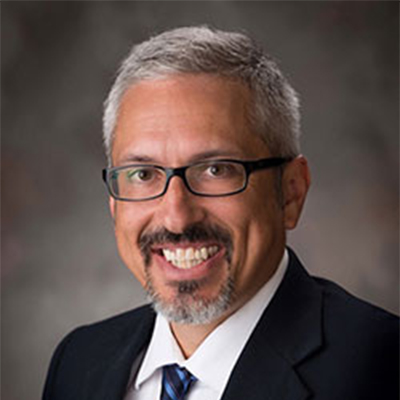 Aaron Dominguez, Provost
Aaron Dominguez, Provost
The Catholic University of America
Aaron Dominguez is provost and an ordinary professor of physics at The Catholic University of America. From 2016 to 2019, he served as dean of the School of Arts and Sciences. His main area of research is in using particle colliders to search for new physics, including the recently discovered Higgs boson. His area of expertise is in instrumentation — designing, building and using silicon charged particle trackers as precision tools to reconstruct the complicated interactions taking place in these collisions.
He received his undergraduate degrees from Whitman College and Caltech, his Ph.D. in physics from UC San Diego and was a postdoctoral researcher at Lawrence Berkeley National Laboratory. In 2005, he was the recipient of the NSF CAREER award. He has held numerous leadership positions in the L3, CDF and CMS particle physics experiments at the CERN laboratory in Switzerland and Fermilab in Chicago. He is currently deputy project leader for the upgrades of CMS and is the principal investigator of an NSF project that is funding the U.S. efforts of nine universities to improve the silicon pixel detector, hadron calorimeter and trigger in preparation for high luminosity runs of the LHC in coming years. He sits on several advisory boards, including QuarkNet, and is an author on more than 1,100 papers in experimental high energy physics and instrumentation.
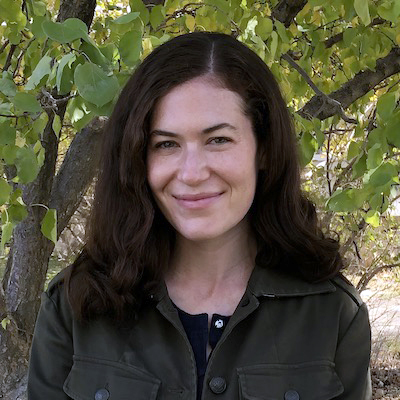 Anna Feuer, Julian Steward Chair of Social Sciences
Anna Feuer, Julian Steward Chair of Social Sciences
Deep Springs College
Anna Feuer is the Julian Steward Chair of Social Sciences at Deep Springs College. She holds a Ph.D in Political Science from Yale, an M.A. in International Studies and Diplomacy from the University of London, a M.S. in Global and Imperial History from University of Oxford, and a Bachelor’s in English Literature from Columbia University. Feuer’s articles have been published in The Economist and the Los Angeles Review of Books. Her interests range from South Asian politics to archival methods, and her dissertation was entitled “The Frictionless Battlefield: Nature and Technology in Counterinsurgency Wars.”
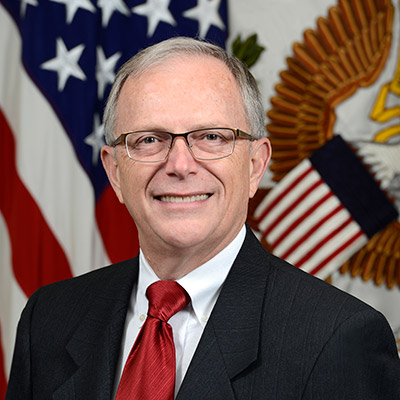 Bruce Jette, President and CEO
Bruce Jette, President and CEO
Innvistra, LLC
Former Assistant Secretary of the Army for Acquisition, Logistics and Technology
Dr. Bruce D. Jette established Innvistra LLC upon completing service as a Presidential appointee on January 20, 2021. Innvistra focuses on assisting academia, entrepreneurs, developers, manufacturers, logistics, and financial entities to develop innovative visionary strategies that support growth and expand their markets in government and the commercial sector through consultancy.
Dr. Bruce D. Jette was confirmed by the United States Senate as the Assistant Secretary of the Army for Acquisition, Logistics and Technology (ASA(ALT)) on December 20, 2017 and sworn into office on January 2, 2018. He served as the Army Acquisition Executive, the Senior Procurement Executive, the Science Advisor to the Secretary of the Army, and the Army’s Senior Research and Development official. He also had principal responsibility for all Department of the Army matters related to logistics.
Dr. Jette led the execution of the Army’s acquisition function and the acquisition management system. Responsibilities included providing oversight for the life cycle management and sustainment of Army weapon systems and equipment from research and development through test and evaluation, acquisition, logistics, fielding, and disposition. This included management and prioritization of the Army’s nearly $90B annual procurement budget and over $200B in funds on contract. In support of COVID-19 relief efforts, $100B was added to management responsibilities. He was also responsible for appointing, managing, and evaluating program executive officers (more than 80 General and Senior Executive Service officers) and managing the Army Acquisition Corps (more than 1,500 officers) and Army Acquisition Workforce (in excess of 35,000 personnel). He also oversaw the Elimination of Chemical Weapons program on behalf of the Secretary of Defense.
Prior to his confirmation, Dr. Jette served as President and Chief Executive Officer of Synovision Solutions LLC, an innovative company he founded providing management and technical consulting, engineering, and project management supporting governmental and commercial industry.
A decorated veteran of 28 years active duty, Dr. Jette retired as a Colonel following a career that included armor and cavalry company commands, two overseas tours, battalion and brigade staff assignments, and over two years of operational deployments to Afghanistan, Iraq and Kuwait. Highlights of his previous acquisition service included founding the U.S. Army Rapid Equipping Force; serving as Program Manager Solider Systems establishing Program Executive Office Soldier; and selection as the U.S. Army PM of the Year as Product Manager for all Army airborne electronic warfare systems.
Dr. Jette graduated the United States Military Academy with a Bachelor of Science degree in Nuclear Engineering and Chemistry. He holds both a Master of Science and Doctorate in Material Science - Electronic Materials from the Massachusetts Institute of Technology. He also taught at the Edmund A. Walsh School of Foreign Service Security Studies, Georgetown University as an Adjunct Professor.
His numerous military awards and commendations include the Distinguished Service Medal, Legion of Merit (3), Bronze Star Medal, Meritorious Service Medal (3), Army Commendation Medal, Army Achievement Medal (2), National Defense Medal (2), Operation Iraqi Freedom Campaign Ribbon, Operation Enduring Freedom Ribbon, Army Service Ribbon, Army Overseas Ribbon (2), Parachutist Badge, Army General Staff Award, Order of St. Maurice, Order of St. Barbara, and Order of St. George.
 Ron Keesing, Vice President for Artificial Intelligence
Ron Keesing, Vice President for Artificial Intelligence
Leidos
Ron Keesing is the Vice President for AI at Leidos, where he is responsible for developing and implementing the company’s AI and ML strategy. He leads the Leidos AI Accelerator, a team of top data scientists, AI researchers, and solution architects addressing the company’s most challenging problems in AI and ML. He has been conducting and directing R&D in AI, ML, and related technologies for over 25 years. He has done pioneering work on programs addressing a broad range of technical challenges, from forecasting complex events like cyber threats and political instability from sparse data to discovering new potential cancer treatments by extracting and aligning knowledge embedded within massive datasets and research publications to creating the first generation of autonomous systems for spacecraft command and control. He is a Leidos Technical Fellow and has authored papers and patents in diverse subfields of AI. He serves in an advisory capacity for external organizations including the Center for New American Security, where he is a member of the Task Force on Artificial Intelligence and National Security. His current research focuses on AI Trust and Ethics.
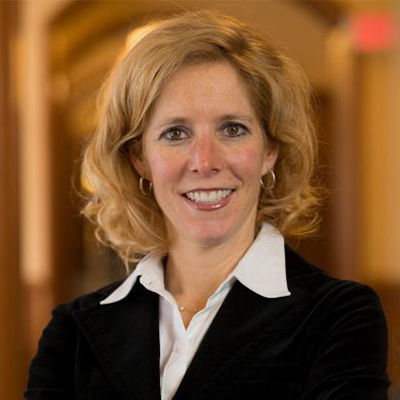 Sarah Kreps, John L. Wetherill Professor, Adjunct Professor of Law, Director of the Cornell Tech Policy Lab
Sarah Kreps, John L. Wetherill Professor, Adjunct Professor of Law, Director of the Cornell Tech Policy Lab
Cornell University, Department of Government
Sarah Kreps is the John L. Wetherill Professor in the Department of Government, Adjunct Professor of Law, and the Director of the Cornell Tech Policy Lab at Cornell University. Her teaching and research focus on the intersection of international politics, technology, and national security.
She has written five books, including, most recently, Social Media and International Relations (Cambridge University Press, 2020). Other books include Taxing Wars: The American Way of War Finance and the Decline of Democracy (2018), Drones: What Everyone Needs to Know (2016), Drone Warfare (2014) and Coalitions of Convenience: United States Military Interventions after the Cold War (Oxford 2011).
Beyond these books, Dr. Kreps's work has appeared in a number of academic journals such as the American Political Science Review, World Politics, Journal of Politics, and International Security, and policy outlets such as Foreign Affairs and Foreign Policy. Her opinions have been featured in a series of media outlets including The Washington Post, New York Times, BBC, USA Today, CNBC, and CNN.
Dr. Kreps is a Non-Resident Senior Fellow at the Brookings Institution and has held fellowships at the Council on Foreign Relations, Harvard’s Kennedy School of Government, West Point, and the University of Virginia’s Miller Center for Public Affairs. She has a B.A. from Harvard, MSc from Oxford, and Ph.D from Georgetown. Between 1999-2003, she served as an active duty officer in the United States Air Force.
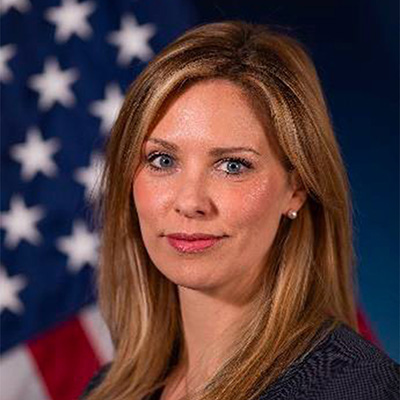 Bartlett Russell, Program Manager
Bartlett Russell, Program Manager
DARPA
Dr. Bartlett Russell joined DARPA as a program manager in April of 2019. Her work focuses on understanding the variability of human cognitive and social behavior to enable the decision-maker, improve analytics, and generate autonomous and AI systems that enable human adaptability. She manages the Habitus, Enhancing Design for Graceful Extensibility (EDGE), Urban Reconnaissance through Supervised Autonomy (URSA), associated Virtuous AI, and Non-Escalatory Engagement to reduce Dimensionality (NEED) programs. Prior to joining DARPA, Russell was a senior program manager and lead of the Human Systems and Autonomy research area in Lockheed Martin’s Advanced Technology Laboratories. Before Lockheed, she conducted field and lab work examining the effect of stress on cognition, and spent more than 10 years examining the implications of biotechnological developments on military competitions. Russell received her doctorate in neuroscience and cognitive science from the University of Maryland, College Park; her master’s degree in security studies from Georgetown University’s Walsh School of Foreign Service; and her bachelor’s degree from Northwestern University
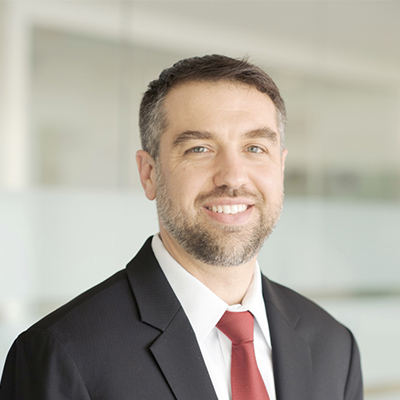 Paul Scharre, Vice President and Director of Studies
Paul Scharre, Vice President and Director of Studies
Center for a New American Security
Paul Scharre is the Vice President and Director of Studies at the Center for a New American Security. He is the award-winning author of Army of None: Autonomous Weapons and the Future of War, which won the 2019 Colby Award and was named one of Bill Gates’ top five books of 2018.
Scharre previously worked in the Office of the Secretary of Defense (OSD) where he played a leading role in establishing policies on unmanned and autonomous systems and emerging weapons technologies. He led the DoD working group that drafted DoD Directive 3000.09, establishing the Department’s policies on autonomy in weapon systems. He also led DoD efforts to establish policies on intelligence, surveillance, and reconnaissance (ISR) programs and directed energy technologies. Scharre was involved in the drafting of policy guidance in the 2012 Defense Strategic Guidance, 2010 Quadrennial Defense Review, and Secretary-level planning guidance. His most recent position was Special Assistant to the Under Secretary of Defense for Policy.
Prior to joining OSD, Scharre served as a special operations reconnaissance team leader in the Army’s 3rd Ranger Battalion and completed multiple tours to Iraq and Afghanistan. He is a graduate of the Army’s Airborne, Ranger, and Sniper Schools, and Honor Graduate of the 75th Ranger Regiment’s Ranger Indoctrination Program.
Scharre has published articles in The New York Times, Wall Street Journal, CNN, TIME, Foreign Policy, Foreign Affairs, Politico, and The National Interest, and has appeared on CNN, MSNBC, Fox News, NPR, and the BBC. He has testified before the House and Senate Armed Services Committees and has presented at the United Nations, NATO, the Pentagon, the CIA, and other national security venues. He holds a Ph.D. in War Studies from King’s College London and an M.A. in Political Economy and Public Policy and a BS in Physics, cum laude, from Washington University in St. Louis.
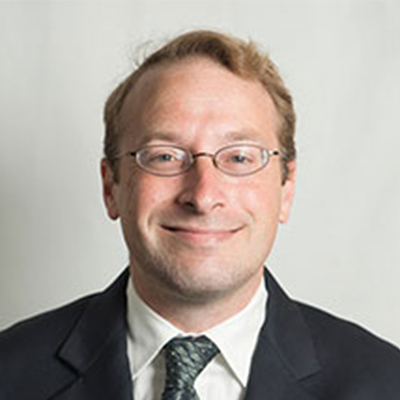 Paul Scherz, Associate Professor of Moral Theology/Ethics
Paul Scherz, Associate Professor of Moral Theology/Ethics
The Catholic University of America, School of Theology and Religious Studies
Paul Scherz is Associate Professor of Moral Theology and Ethics in the School of Theology and Religious Studies at the Catholic University of America. He also co-directs the joint Catholic Clinical Ethics program with Georgetown University’s Pellegrino Center for Clinical Bioethics, is a Visiting Fellow at the Institute for Advanced Studies in Culture at the University of Virginia, and is an Advisory Fellow at the Grefenstette Center for Ethics in Science, Technology, and Law at Duquesne University.
He began his academic career researching the genetics of embryonic development. After completing a B.A. at U.C. Berkeley, a Ph.D. in Genetics at Harvard University, and a Helen Hay Whitney postdoctoral fellowship at UCSF, he decided to investigate the theological and ethical implications of biomedical research. He received an M.T.S. and a Ph.D. in Moral Theology from the University of Notre Dame.
His research examines the ethics of genetic research, moral formation in research, and the ethical effects of technology. He is the author of Science and Christian Ethics (Cambridge, 2019) and co-editor with Joseph Davis of The Evening of Life: The Challenges of Aging and Dying Well (Notre Dame, 2020). His forthcoming book, Tomorrow’s Troubles: Risk, Anxiety, and Prudence in an Age of Algorithmic Governance (Georgetown, 2022), examines the role of quantitative risk analysis in contemporary culture and ethics.
 Mary Magee Quinn, PhD, PMP, Human Systems Integration SME
Mary Magee Quinn, PhD, PMP, Human Systems Integration SME
Leidos
Dr. Quinn is a nationally recognized expert in the social and behavioral sciences with more than 30 years of experience. Her work currently focuses on behavioral applications for intelligence exploitation, Human Machine Teaming, Human Systems Integration, Human Centered Design, trust and ethics of Artificial Intelligence, training, and upskilling. She has designed quasi-experimental, single subject, usability validation, and survey research and data analysis methodologies. She is an expert on protection of human subjects and global privacy policies.
She conducts research into the understanding of Manned/UnManned Teaming (MUM-T) shared situation awareness and calibration of operational end users trust in the artificial intelligence capabilities and decision making for the US Air Force Research Laboratory. She led conduct of human use research that evaluated Army intelligence analyst performance using the DARPA Insight suite of automated software tools for intelligence, surveillance, and reconnaissance. She employed a comprehensive assessment framework that measured workload, situation awareness, trust, usability, and usefulness in conjunction with mission/ task-specific metrics. Initially, analysts refused to use the automated analysis features. Dr. Quinn led the redesign of the user interface and modified the training provided to the analysts to enhance the transparency and understandability of the automation. Analysts subsequently embraced the automation and significant gains were obtained in mission performance.
Dr. Quinn led development and delivery of training to instructors for the USAF Distributed Common Ground System (DCGS) Weapon Systems Trainer (DWST). Later, she led the feasibility study and prototype development effort for AFRL that evolved DWST into a simulation for training SIGINT analysts.
She is currently leading an internal Leidos project to incorporate Human System Integration methods and practice into the engineering and system life cycle development processes applied across the enterprise; and developing a multi-level human-machine teaming (HMT) performance measurement framework.
Dr. Quinn, a Leidos Technical Fellow, has conducted over 200 major presentations and keynote addresses at national and international conferences, and has authored more than 80 publications in peer-reviewed journals, 3 books, and 27 monographs. She is leading an IEEE workshop on Methods for Using the 2020 NIST Principles for AI Explainability in December.
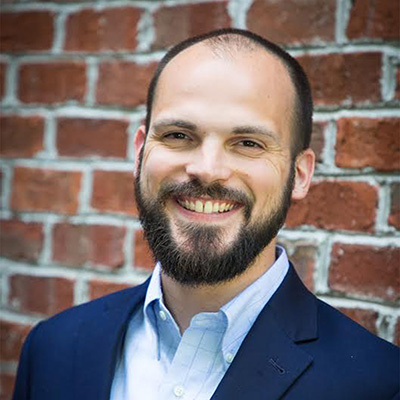 Luis Vera, Assistant Professor of Theology
Luis Vera, Assistant Professor of Theology
Mount Saint Mary’s University
Luis Vera teaches at Mount Saint Mary’s University in Emmitsburg, Maryland and explores the links between fundamental moral theology, technology ethics, and Catholic Social Teaching. He is currently preparing a book about memory as a fruitful focus point for interpreting and evaluating digital media as well as for conversing with the Catholic tradition on the ethics of media use. He also focuses on theologies of revelation, spatial ethics, and moral questions surrounding childhood, parenting, and education.
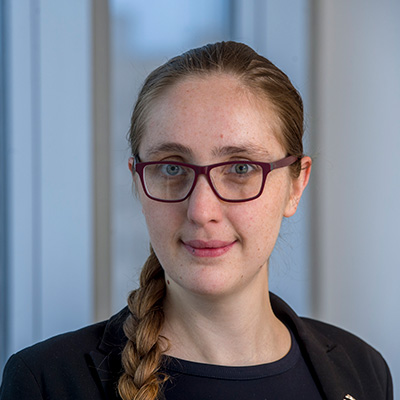 Maaike Verbruggen, Doctoral Researcher, Center for Security, Diplomacy and Strategy
Maaike Verbruggen, Doctoral Researcher, Center for Security, Diplomacy and Strategy
Brussels School of Governance; Vrije Universiteit Brussel
Maaike Verbruggen is a Ph.D Researcher at the International Security Cluster. She specializes in Emerging Military and Security technologies and Arms Production, Trade, and Control. Her Ph.D is on Military Innovation in Artificial Intelligence and Autonomy, with research on drones/unmanned systems, biotechnology and human enhancement on the side. She has a B.A. in History and a BSc in Sociology from the Radboud Universiteit Nijmegen (the Netherlands), and a MPhil in Peace and Conflict Studies from Universitetet i Oslo (Norway).
Verbruggen has experience working on the societal implications of technology, defense innovation, arms trade, export controls, arms control, disarmament and international law. Previously, she worked at the Stockholm International Peace Research Institute (SIPRI), and she interned at the Department of Arms Control, Non-Proliferation, Disarmament and Export Controls at the Dutch Ministry of Foreign Affairs; and at the Information and Outreach Branch at the United Nations Office of Disarmament Affairs (UNODA).